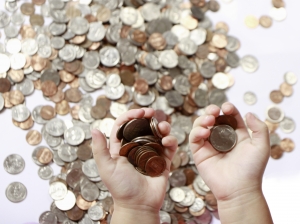This is what I wrote on the side of our fridge Saturday afternoon:
Focus on what you CAN do,
Rather than what you don’t know.
It came out of an interaction with Elisha that morning, where he *PANICKING!* was running out of time to finish emptying the dishwasher.
“Where does this go?” he’d gasp, running from the kitchen. “What about this?”
And I kept telling him, with increasing irritation, “There’s a whole dishwasher of things you do know what to do with. Save what you don’t know for later.”
It was weird because I always put away the esoteric stuff anyway, like canning funnels or flour sifters.
But it was that fridge line that became the mantra, to the point that I wrote it where we’ll all see it 16-times each day.
It’s a funny (odd) line to think on, as there’s not the parallelism you’d expect.

Image courtesy of Sue Byford via stock.xchng
But is wasn’t until the kids were down for the night, and I was alone in the house (Jay was gone for the weekend, catching salmon to stock our freezer.) that I saw that morning conversation as foreshadowing.
Have you ever seen foreshadowing in your own life? I’d love to hear about it.
Alone with my thoughts is not always a safe place to be, because (like my darling children) I have the ability to escalate.
And as a fairly intelligent adult, my escalations have the terrifying ability to be plausible.
Over the last two years (maybe I’ll tell that story someday) I’ve discovered the tar pit of anxiety, along with depression. It’s a tricky place for me, because my understanding of intellectual honesty is that you don’t pull back from an idea just because it gets uncomfortable.
So I’ve assumed for years that being uncomfortable is part of the process of being honest.
I ran into trouble when there were so many variables that a specific, concrete truth was not knowable.
That’s something I saw Saturday night.
A new data point entered my world, with a kaleidoscope of refracting possibilities. I could actually feel the tension in my chest preparing for take-off. Then I walked by
Focus on what you CAN do,
Rather than what you don’t know.
For the tiniest instant it felt like lying to myself. It felt like sticking my head in the sand.
But no “truth-telling” or looking closer at the problem would have resolved it. Continue reading »








